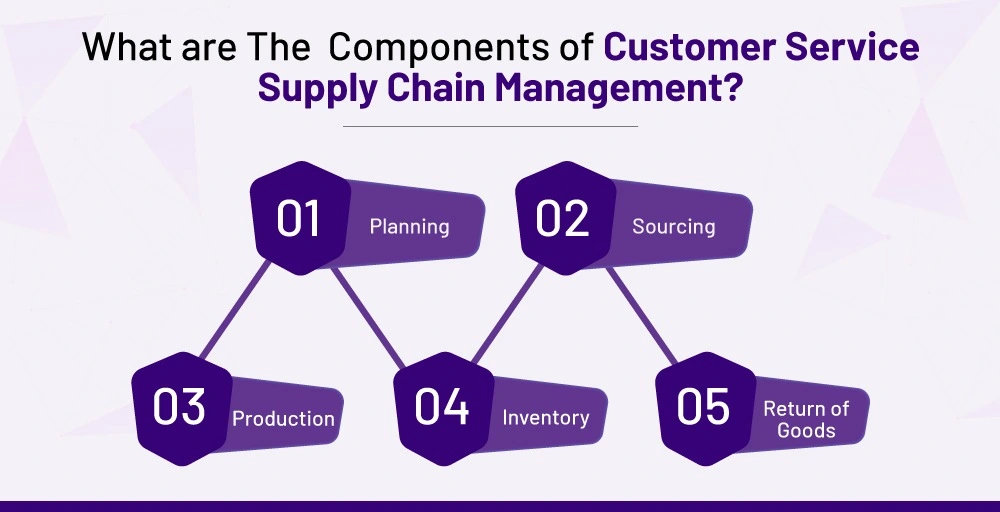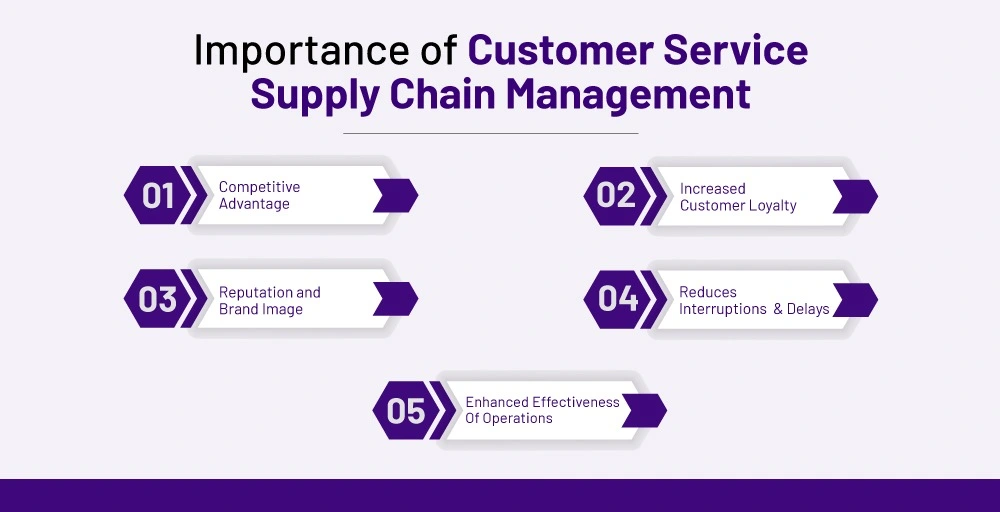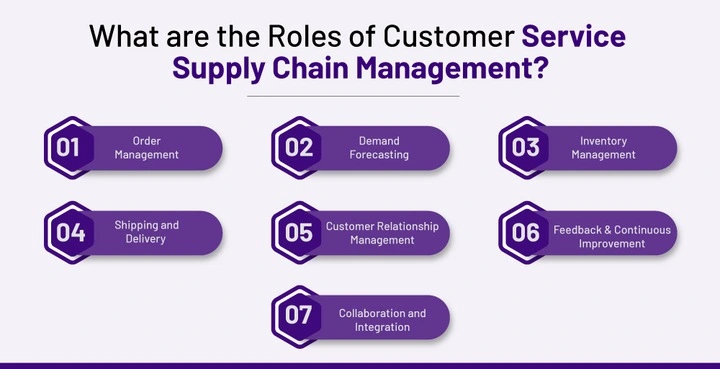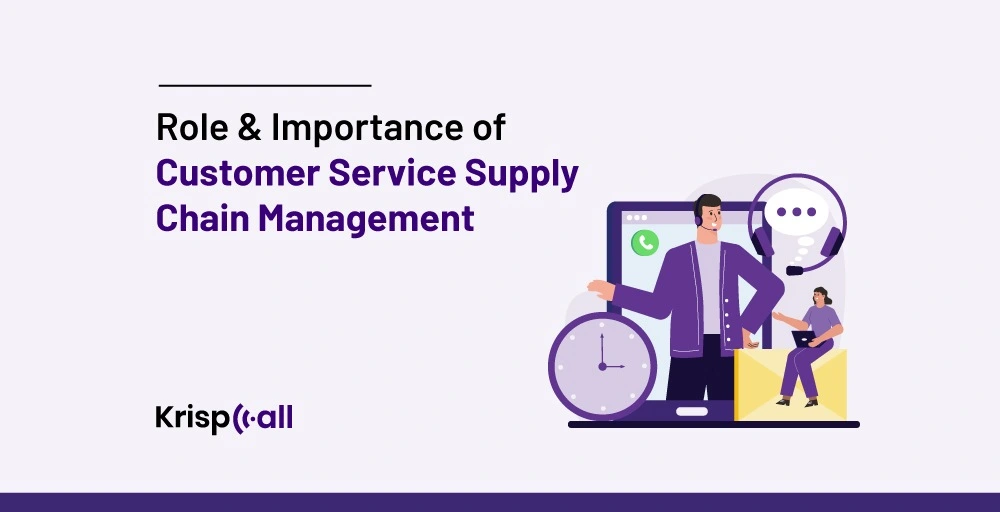Imagine you’ve ordered a product online 🌐. What are your expectations from the moment you make the order until it reaches your doorstep🚪?
Effective customer service supply chain management ensures clear and timely communication through multiple channels, keeping you informed every step of your purchase.
Integrating customer service principles with supply chain management allows for a seamless and satisfying customer experience throughout the customer lifecycle 🔄.
In this article, we’ll discuss customer service supply chain management, its components, its importance, and the role of customer service in supply chain management.
🔑 KEY HIGHLIGHTS
- Customer service supply chain management involves coordinating activities to deliver products or services while enhancing customer satisfaction efficiently.
- The components of customer service supply chain management are planning, sourcing, production, inventory, and return of goods.
- Customer service supply chain management is important for competitive advantage, increased customer loyalty, reputation and brand image, reduced interruptions and delays, and enhanced operational effectiveness.
- Some of the roles of customer service in supply chain management are order management, demand forecasting, inventory management, shipping and delivery, etc.
What is Customer Service Supply Chain Management?
Customer service supply chain management is the process of integrating customer service processes with supply chain management. Customer service supply chain management (CSSCM), a combination of customer service principles and supply chain management methods, is designed to control supply chain actions, processes, and instructions so that they not only meet but exceed customers’ needs.

Customer service refers to the assistance and advice a company provides to its customers. It ensures people can access quality products that delight them and provides assistance beyond satisfaction. Supply chain management, or SCM, is the coordination and supervision of all processes involved in manufacturing and delivering goods and services, from raw materials to the final consumer.
Let’s take Amazon’s delivery service as an example. When a customer places an order, the supply chain management system closely collaborates with customer service to ensure that the products are delivered efficiently. The supply chain management uses real-time data from customer service to ensure that the inventory has sufficient products and can be delivered quickly. This synchronization is crucial at every customer service phase.
What are the Components of Customer Service Supply Chain Management?
Customer service supply chain management is an approach that manages the flow or supply of goods and services while prioritizing customer satisfaction. It involves various components to ensure an efficient supply of goods and meet customer expectations.

Some of the components of customer service supply chain management are:
1. Planning
Orderly supply chain management largely relies on the art of planning. It involves making informed choices on how to structure the supply chain. For example, deciding whether to outsource finished goods or produce them internally.
Planning also determines the optimal locations for purchasing finished products or raw materials according to cost, quality, and customer proximity. Customer service representatives play an active role in gathering information and planning about customers’ needs regarding what products they need and when they need them.
2. Sourcing
Locating and selecting suppliers capable of delivering the essentials demands critical sourcing. This ensures that companies satisfy consumers’ wishes. This enhances the supply chain process smoothly by evaluating prospective suppliers based on cost, quality, and dependability.
Sustained communication and collaboration with suppliers enhance uninterrupted and on-time delivery. The supply chain manager must supervise and manage supplier relationships. Ordering, receiving, maintaining inventory, approving payments from suppliers, etc., are all part of this.
3. Production
Efficient production ensures that product deliveries are made to customers in good condition and on time. It is essential to the efficiency of production processes that the correct quantity of goods is made and quality demands are met. This reduces production lead time through improved efficiency in production flow.
The production team receives insights from customer service teams concerning consumer preferences, sales pitch patterns, and unique requirements. Based on this information, they decide what products are needed, how many should be produced, and the most appropriate approach to their manufacture.
4. Inventory
Managing inventory is one of the key parts of how customer service works in any supply chain. It’s not just about having too much product but having enough (finished goods) or raw materials to meet customer demand. Better matching of production timing with actual demand can help optimize stock levels.
Detailed tracking through all levels of inventory enables companies to ensure the availability of products at all times and in all locations. The inventory team notifies the customer care team when a product starts running out. By informing clients about the situation, customer support representatives can help them find another item that might work instead of the one they were looking for.
5. Return of Goods
Managing product returns is a crucial element of supply chain management regarding customer service. Businesses should develop efficient processes for receiving and handling customer returns, which help maintain customer satisfaction. Returned products may require repair, replacement, disposal, or restocking, depending on their condition.
Customer service assists the customer in the return process. After receiving the goods, they check what made the client unhappy and verify whether the product needs any repair. The customer service team plays a vital role in ensuring customers have a positive experience during the return process to establish trust and loyalty.
What are the Importance of Customer Service Supply Chain Management?
Today’s fiercely competitive business environments require companies to be excellent at managing their supply chains. The top priorities are streamlining processes, reducing costs, and improving output to provide quality customer service. Here are some importance of customer service supply chain management:

1. Competitive Advantage
To differentiate your business from the rest of the players in a highly competitive industry where commodities may look alike, your company needs to prioritize customer service above all else.
Excellent customer service can give your company a competitive advantage, especially if it does well in supply chain customer service. Offering personalized services, quick problem resolution, or instant updates about tracking are some of the ways that one can gain an advantage over competitors.
2. Increased Customer Loyalty
Regularly meeting or exceeding customers’ expectations gives them confidence every time they think of your brand, thus making them come back again and even more faithful.
Therefore, Satisfied customers are more likely to stay with you forever, even turning some of them into your most prominent promoters who can boost additional businesses to your brand.
3. Reputation and Brand Image
When a company delivers exceptional customer care, it can significantly increase the organization’s brand image and reputation. For this reason, those with positive consumer experiences are more inclined to spread this message, thereby becoming brand ambassadors.
On the contrary, delivering poor customer service can damage a company’s status among other businesses while creating cycles of negative appraisal within a given industry.
4. Reduces Interruptions and Delays
Efficient problem-solving and proactive risk reduction are critical for efficient supply chain management.
A timely customer service priority enables your company to identify interruptions early enough for rectification to minimize the effect on orders. Managing expectations and reducing delays need straightforward communication, availability, and active response.
5. Enhanced Effectiveness of Operations
When a supply chain has a strong customer service strategy that aids in optimizing business process outsourcing, there is a lower possibility of mistakes, fewer interruptions, and higher general effectiveness.
All of these have a significant effect on the economy by reducing expenses, therefore lowering costs. Companies can improve their operations and enhance their customer satisfaction score (CSAT) by responding to customer complaints quickly and effectively.
What are the Roles of Customer Service in Supply Chain Management?
Customer service plays an increasingly crucial role in the performance of supply chain management in the current fast-paced, competitive business backdrop. Consumers need to be satisfied faster, more bespoke, and more seamlessly. Consequently, businesses’ ability to coordinate customer service principles with the purchase method can give them competitive advantages.

Some of the roles of customer service in supply chain management are:
1. Order Management
Customer service representatives are duty-bound to receive and process consumers’ orders correctly. This implies that they should be accurate in the order facts, double-check product availability, and forward the order to the appropriate fulfillment team. If you want to run a successful supply chain, you must prioritize keeping your customers happy and satisfied.
2. Demand Forecasting
Customer service personnel constantly need to talk to clients; therefore, they are very used to their buying habits. Accordingly, they know what products they like, when they usually buy them, and what they typically buy. The support team, therefore, gives this valuable information about customers to other distribution team members, including production and inventory managers.
3. Inventory Management
Good customer service is essential at every stage of the supply chain for monitoring and communicating about product availability. They monitor the number of items in the store, identify shortages, and order refills for the best-selling products in coordination with logistics and warehousing units. This enables customers to find what they need at all times.
4. Shipping and Delivery
Customer service representatives must ensure timely delivery and excellent condition of customer orders. They partner with shipping and logistics teams to track shipments, provide accurate delivery times to consumers, and address any transportation issues. Keeping clients satisfied significantly relies on reliable and uninterrupted shipment.
5. Customer Relationship Management
Customer relationship management provides companies with profound insights about their customers, allowing them to personalize their supply chain logistics and provide the best customer experience. This is also helpful in creating closer and more cooperative relationships with customers and addressing their issues on time. This valuable data and insights about the customers can be beneficial to improving the supply chain.
6. Feedback and Continuous Improvement
Customer care agents benefit from constructive feedback from clients, which provides input concerning how customers view the product and the entire supply chain. When this feedback is shared with the right people within an organization, it enables such companies to identify areas for improvement, making decisions based on facts that help meet customer satisfaction.
7. Collaboration and Integration
Supply chain performance and the ability to respond to customer requirements are enhanced through collaborative efforts by different functions or teams. To ensure that information flow and coordination are effective, customer service professionals closely collaborate with other operations in the supply chain, like manufacturing, transportation, and purchasing.
Conclusion
Customer service must be prioritized to achieve a great customer experience while managing the supply chain. If customer service and supply chain logistics are integrated well, businesses may understand their customers’ wants and provide the relevant service.
Connecting customer service closely with supply chain management can benefit the business by boosting customer satisfaction, developing loyalty, and increasing customer retention. This facilitates indepth and responsive handling of changing customer demands. Efficient order delivery and effective customer feedback collection are responsible for continued improvements in supply chain management.
FAQs
What are the challenges in implementing customer service supply chain management?
The challenges in implementing customer service supply chain management are difficulties predicting consumer demand, rising shipping costs, risk management, supplier relationships, finding qualified personnel, unforeseen delays, and adapting to fast-changing markets.
Are customer service and supply chain connected?
Yes, customer service and supply chain are connected. Effective supply chain management is crucial for delivering products to customers on time and in good condition, which directly impacts customer satisfaction and loyalty.
Can customer service feedback improve the supply chain?
Yes, customer service feedback can improve the supply chain by providing valuable data to enhance operations and ensure customer satisfaction.





